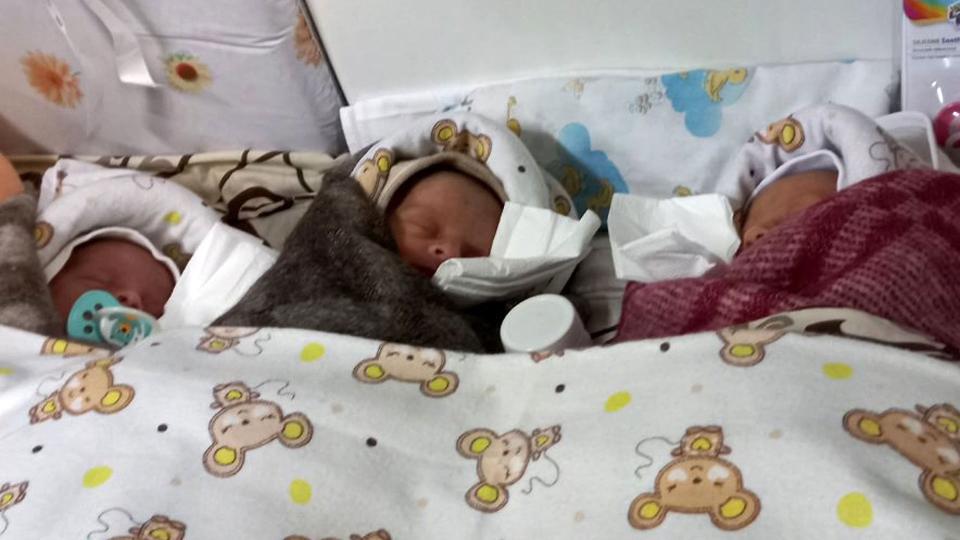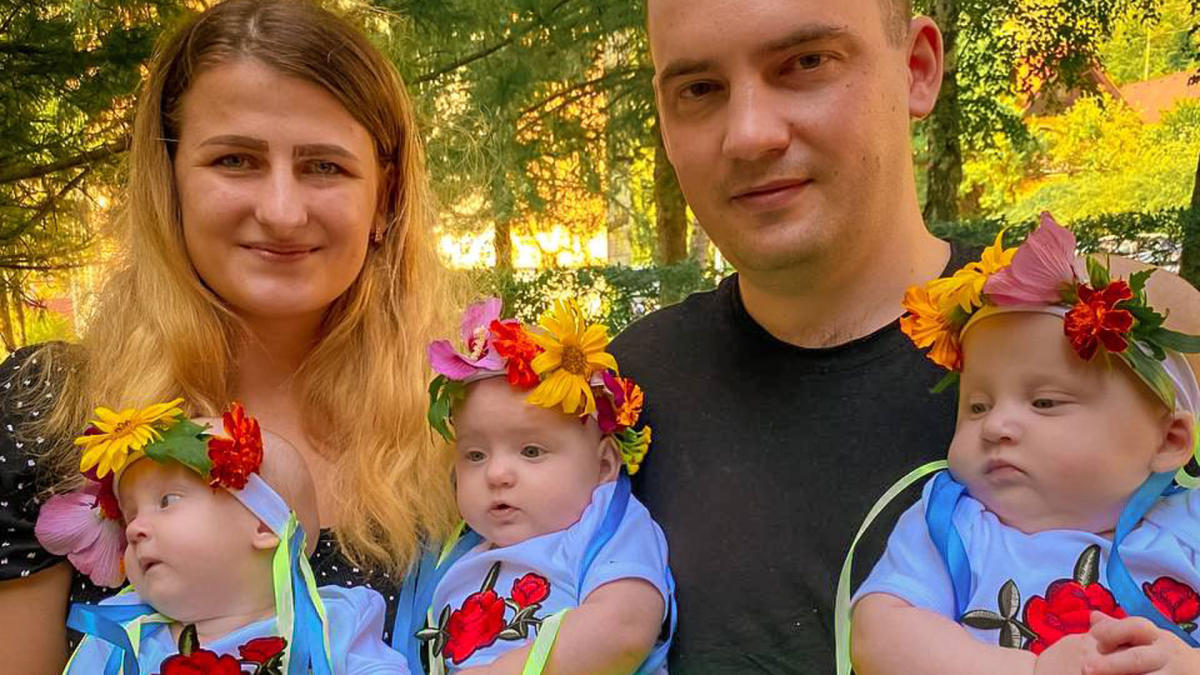Ukrainian couple Hanna and Andriy Berezynets were delighted when they found out they were expecting triplets. But on the day the babies were due, war broke out and the little girls were born to the sound of Russian shells falling around them.
When Hanna went for her first ultrasound scan, it showed a small dot – the baby she and Andriy had planned for so long. But on their next visit to the doctor they were told they were expecting twins. The third visit revealed she was actually pregnant with triplets.
“We were afraid to see the doctor for the fourth appointment,” Hanna jokes. But the couple were happy. “We really wanted children. God had heard us and gave us three at once,” she tells the Ukrainecast podcast.
Hanna went into a maternity hospital in Chernihiv on 23 February 2022 for a Caesarean section, which was scheduled for the next morning.
Rumours about a Russian invasion had been spreading for a while but she did not believe them until early on 24 February when she got a message from her brother, who was studying at a military school. He told her that the war had started and he did not know where he was going to be sent. He urged her to leave Chernihiv.
But she could not leave straight away. Her operation was planned for 09:00 and the hospital staff were preparing to deliver their first triplets in three years.
Hanna could not believe the war had begun: “I thought it would happen somewhere far away, in a field, a forest, but not in our lives.”
Andriy arrived at the hospital at 06:00 carrying suitcases filled with clothes and other supplies and tried to calm her down. “He said that the main thing was to bring our children into this world,” Hanna recalls.
The babies were born just minutes apart: Emilia at 09:36, Olivia at 09:37 and at 09:38 it was Melania’s turn. “I couldn’t imagine they would be so beautiful,” says Hannah.

Ten minutes later, at 09:48, the Ukrainian state border service officially announced that Russian military vehicles had entered the Chernihiv region.
The bomb shelter
Chernihiv is in northern Ukraine on the border with Belarus – where Russian troops invaded from – and was immediately hit by shelling. Although Russia did not occupy the city, it was badly damaged.
On the evening after she gave birth, recovering from surgery and barely able to get out of bed, Hanna was told to go down to a bomb shelter with her babies. “I was totally lost. I didn’t understand how I would get there,” she says.
To reach it, she had to go outside, where the temperature was close to zero. The nurses wrapped the babies in warm blankets and carried them for her.
There were about 100 people with newborns in the shelter and hospital staff delivered 20 babies down there, they later told Ukrainian media.

Although Hanna’s daughters were healthy, they were premature. Normally, they would have been put in a special incubator, but there wasn’t one in the shelter, so the nurses took it in turns to cuddle them under their clothes to keep them warm.
“The girls were so defenceless. I was lying next to them and didn’t know how to help them,” Hanna says, her voice trembling.
They were tiny – Emilia and Melania weighed just 3.5lb and 3lb (1.6kg and 1.4kg), but Olivia was even smaller. She was 2.5lb (1.1kg) and she needed to be moved to the intensive care unit if she was going to survive.
Hanna and Andriy decided they couldn’t send her there alone, so after a week in the bomb shelter the whole family moved up to the hospital’s first floor.
Olivia was in intensive care for about two weeks. “We stayed in the hospital’s corridor with the other two girls and only went down to the basement when there were massive explosions,” says Hanna.
At one point, Hanna was sitting in a corridor with Emilia and Melania, when she suddenly saw a massive flash followed by pitch darkness and smoke.
“I jumped up and grabbed my children, not knowing whether I was dead or alive,” she says.

Then she saw Andriy running towards her and they rushed to the intensive care room to see if Olivia had been hurt.
They ran past shattered windows, blown-off doors and destroyed walls. But luckily Olivia’s room had not been touched and she was safe.
‘Hold on, I’m protecting you’
Finally, on 20 March the family left the hospital and with the help of volunteers were evacuated to Kyiv.
The journey, which would normally have taken two hours, took five as they had to take a roundabout route to avoid Russian troops.
They later spent a few months in Slovakia before returning to their hometown.
All that time, Hanna was desperate for her father Anatolii to meet his granddaughters. He was fighting in the Ukrainian army and his messages were a source of huge strength.
“He kept saying: ‘Hold on, I’m protecting you, I’m defending you. We will fight the Russians off,'” she recalls.

After Russian forces withdrew from the Chernihiv region in April 2022, Anatolii was sent to eastern Ukraine.
The family hoped he would come home in time for the girls’ first birthday, but he never made it. On 11 January 2023 he was killed on the front line near Terny village in Donetsk. He was 51 years old.
“I keep thinking that the war will end and he will come home from the battlefield,” says Hanna with tears in her eyes. “I can’t believe that our whole family won’t be together.”
She and Andriy compare the first year of their babies’ lives to “a scary movie”, but they say that thanks to the girls, there has also been a lot of love and happiness – “three times more”.

Listen to the full story on BBC Ukrainecast








